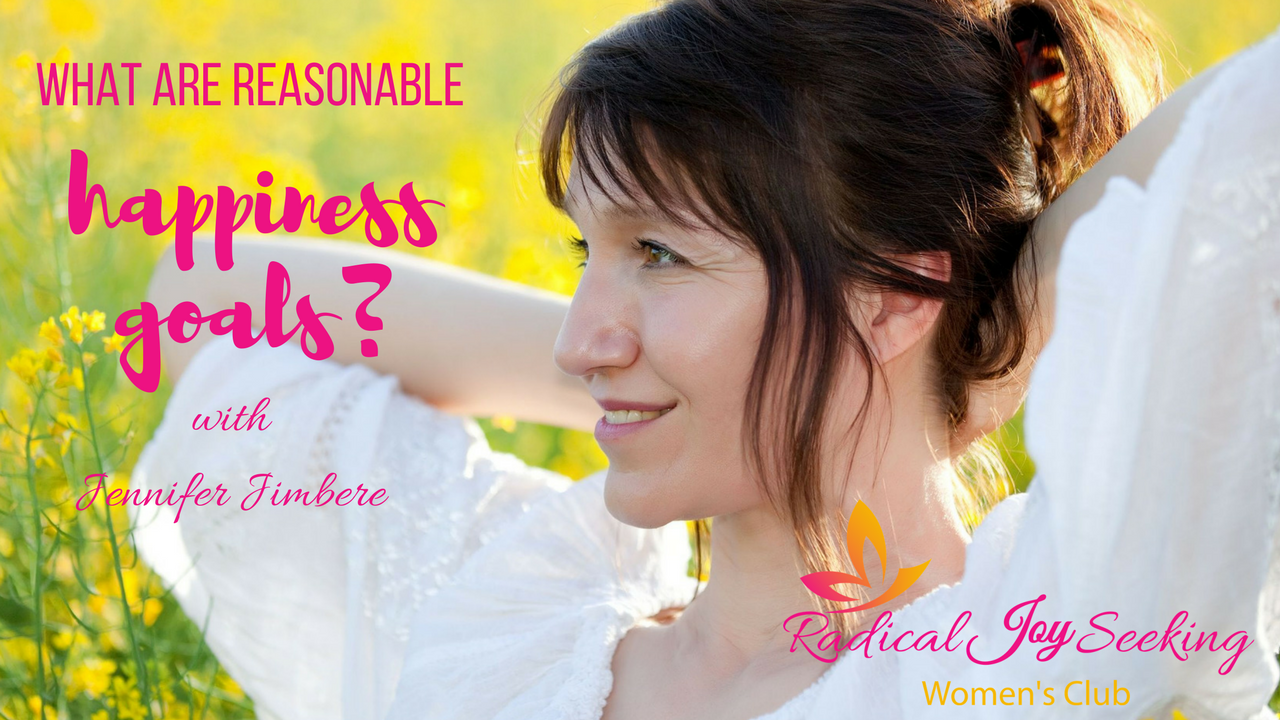What Are Reasonable Happiness Goals?


People mistakenly think intense delight is a sign that their attempt at awakening joy is truly successful.
In our competitive culture, we usually think, “More is better.” Being Number One, winning at all costs, and “having the most” are deeply ingrained in our psyche as real success. This model of going for the max is often erroneously applied to our own well-being.
However, when we look for bells and whistles as indications of true happiness we’re misunderstanding a very important principle: Setting a high bar of intense happiness works against true well-being. Although I’m all for enjoying peak experiences when they arise, measuring that ideal against a moderate level of okayness can easily render this moment as “not good enough.”
We find what we look for. Science calls this phenomenon the brain’s “confirmation bias.” Your brain tends to see what it believes to be true and misses whatever doesn’t confirm its hypothesis. If you don’t think you experience much true happiness because you’re holding an image that it should be a peak experience of ecstasy, you probably will keep confirming that belief.
What’s the alternative? Aim for noticing how you really feel right at that moment—and embrace all your diverse feelings.
There are studies that show continually pursuing happiness actually may be detrimental to your mental and physical health. People who have “emodiversity”—meaning they express a full range of emotions including anger, worry and sadness—are actually healthier than those whose range tends to be mostly on the positive side.
When we try too hard to attain happiness we may be setting ourselves up for its opposite. Researcher Iris Mauss and colleagues have shown that sometimes people chase happiness to an unrealistic degree, which can actually end up leading to major disappointment. It can turn into a vicious cycle where the harder you try for happiness the more elusive it becomes.
So perhaps it’s better not to try so hard to be happy.
It’s OK to feel OK
I recommend that one simply begin noticing moments of feeling okay. If you tend to have a life filled with intense drama, I often suggest being aware of moments when you’re not miserable. That’s a good start.
However, if you see moments of “okayness”—moments where you’re not suffering—as moments worthy of appreciation, you open the channel to true well-being. And the more you notice and take them in, the stronger that flow of well-being naturally grows—not through force but through wise attention.
As neuroscience expert Rick Hanson says: “The brain is like Teflon for positive experiences and Velcro for negative ones.” We need to train ourselves to appreciate and take in those simple moments of life where things are actually okay.
When you let go of looking for ecstatic states, you can find joy in the most commonplace moments. Inside the club, I created a lesson entitled Experiencing AWE in everyday life. I take the members though a lesson on how you can be on the look out for those moments and savor them.
I remember a few years ago hearing Dr. Barbara Fredrickson gave instructions on the heart practice called “Loving-kindness meditation”. She said that sometimes the word “loving-kindness” can seem so lofty and noble that we imagine it’s beyond our reach. She suggested connecting with the simple feeling of “kindness” or “friendliness” towards oneself or others.
That’s so much more accessible and it will start the gentle flow of good-heartedness we’re looking for. It really worked. As I let go of getting a gold-star in my loving-kindness practice I simply enjoyed extending good will and let myself be touched by my kind heart.
In some Eastern philosophical models of happiness, refined states of well-being are considered ultimately more sustainable and more satisfying. As wonderful as it is, rapture is considered a courser level of happiness that, after awhile, becomes jangling to the system. Going up the ladder of refined states, gladness, happiness, and contentment are considered qualities that are much more developed and fulfilling.
Ultimately, deep peace is the most satisfying state of all and is said to be the pre-cursor to true enlightenment.
So if you’re trying to cultivate genuine happiness within yourself, you might consider letting go of trying to experience a gusher of intensity. Awakening joy comes naturally from truly appreciating the simple moments of well-being in our lives.
Don’t miss them!
Once you start having your radar out for them you’ll see them everywhere.
Maintain momentum and make it a great day,
Jennifer Jimbere
Your Partner in Possibility
Stay connected with news and updates!
Join our mailing list to receive the latest news and updates from our team.
Don't worry, your information will not be shared.
